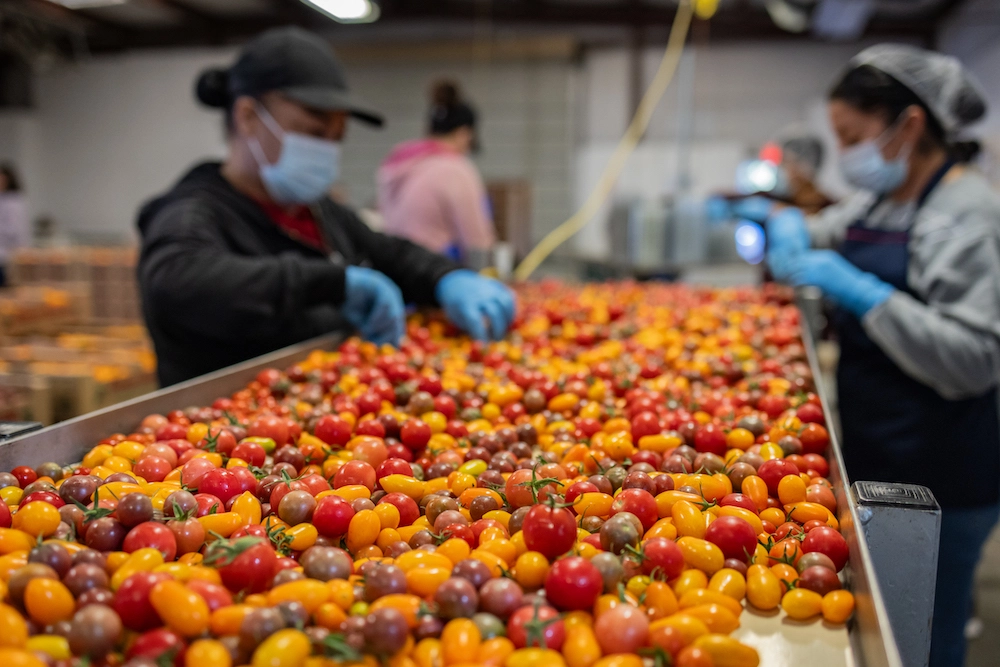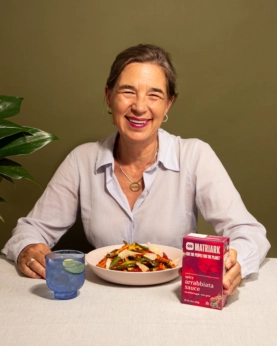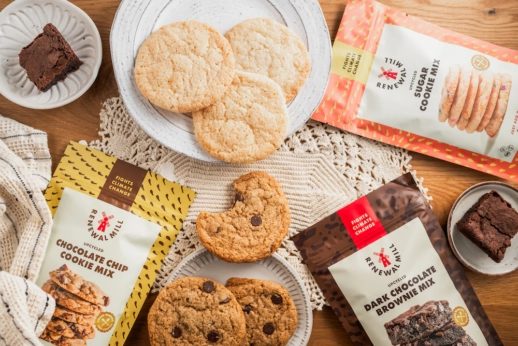This is the Year to Eat More Upcycled Foods
As consumer interest in climate-friendly consumption grows, “upcycled” products—made from food that otherwise wouldn’t be utilized—are gaining steam, with an official certification and more.
This is the Year to Eat More Upcycled Foods
As consumer interest in climate-friendly consumption grows, “upcycled” products—made from food that otherwise wouldn’t be utilized—are gaining steam, with an official certification and more.

Matriark Foods' tomato sauce diverts food from the landfill.by Nikki Ritcher/Matriark Foods
“Upcycled” is the food trend of the year—and, hopefully, it’s one of the rare ones that is here to stay. When announcing their forecasts for food trends in 2024, organizations ranging from Whole Foods to Mintel to the Specialty Food Association predicted a growing consumer interest in foods made with upcycled ingredients.
These ingredients are endlessly diverse, including spent grains from beer production, ripe fruit that is too small for supermarket standards and cacao pulp from the process of making chocolate bars, but they share a similar origin story. In the past, these ingredients were lost somewhere in our food supply chain; now, pathways are being created to ensure they reach consumers.
While other cited trends tend to center on a specific single ingredient or nutrient, the “upcycled” trend is unique in that it shifts the focus from personal to planetary health and longevity. “For the first time, the majority of the world is able to witness the real effects of climate change around them and they are looking for ways to help,” says Caroline Cotto, co-founder and chief operating officer at Renewal Mill, a California-based company that produces baking mixes with upcycled ingredients. “As more consumers look for sustainable foods in the marketplace, upcycled foods rise to meet that demand.”
“It’s this growing awareness that the take-make-waste systems that we’ve all participated in for the last 70 years are making people hungry and making the environment unlivable,” says Anna Hammond, founder and chief executive officer at Matriark Foods, a New York-based company that produces pasta sauces and vegetable broth with upcycled ingredients. “Solving for wasted food is one of the easiest things that almost everyone can participate in to mitigate climate change.”
According to research from ReFED, a national nonprofit dedicated to ending food waste, 38 percent of food in the US was wasted in 2022. That’s 235 million tons of meals that went uneaten, despite the fact that one in eight Americans is food insecure. And it’s not just the food that goes to waste; that year, uneaten food accounted for 6.1 percent of greenhouse gas emissions and 22 percent of all freshwater use in the US.
“Food waste happens literally at every part of our global food supply chain,” says Cotto. “It happens when we leave unharvested food on fields due to cosmetic imperfections; it happens when we improperly store food during transport; it happens through byproduct production at food manufacturers; it happens when grocery stores overorder and throw out food they can’t sell or when restaurants make too much and can’t serve it all; and, in fact, the majority of the wastage still happens in our own homes.”
Avoiding food waste in our kitchens is a crucial first step toward reducing our carbon emissions, water usage and overall impact on the environment.
“There are lots of things we can do to reduce food waste,” says Cotto. “Don’t over purchase. Make a list before you head to the grocery store. Eat leftovers or find ways to repurpose them into delicious new meals. If you’re headed out of town but still have stuff left in your fridge, find ways to gift to your neighbors and freeze everything you can for when you’re back. Compost whatever you cannot eat.”
In addition to carefully and consciously eating all of the food that we buy, opting to purchase upcycled foods allows us to amplify our individual efforts by supporting climate-friendly producers that have an even greater environmental footprint. This is especially important for institutions, such as schools, hospitals and corporate offices, where the effect is even more powerful.
In two reports on food waste in the United States published in December 2023, the Environmental Protection Agency highlighted upcycled foods as a key tool for addressing the climate crisis.
Hammond came to this conclusion on her own several years prior, leading her to found Matriak Foods. There are “three questions that we always ask ourselves in everything we do,” says Hammond. “Does this mitigate food going to landfills and the negative environmental impacts of that? Is this good for small- and mid-scale farmers? Does this create greater access to healthy food for more people?”
These questions are embodied in each of Matriark’s products, including its classic tomato basil pasta sauce. “We work with a roaster of tomatoes who [because of the way his machines work] was throwing out anywhere from 1.5 to 3 million pounds of tomatoes a year,” says Hammond. “We’ve developed a food-safe, compliant way to capture those perfectly ripe tomatoes and puree them into the base of our sauces.” Each carton of this sauce—which is packaged in Forest Stewardship Council-certified materials—diverts 0.4 pounds of food from a landfill and saves 50 gallons of water.

Renewal Mill also partners with other food producers—in its case, the makers of plant-based milks, such as soy milk and oat milk. It collects the leftover pulp from this process, then dehydrates and mills it to be transformed into shelf-stable gluten-free flour. It sells this flour on its own and in vegan baking mixes for brownies, cakes and cookies. Since its founding in 2018, Renewal Mill has diverted more than 700,000 pounds of food waste and avoided more than one million pounds of carbon emissions.
Both Matriark Foods and Renewal Mill belong to the Upcycled Food Association (UFA). “This organization’s first directive was to create a formal definition of upcycled food,” says Cotto, who serves as a board member at UFA. “The definition decided upon was: Upcycled foods use ingredients that otherwise would not have gone to human consumption, are procured and produced using verifiable supply chains and have a positive impact on the environment.”
This definition serves as the foundation for the Upcycled Certified program, which has since certified nearly 500 products that span the spectrum from sweet to savory. In December 2023, an independent, third-party food verification company, Where Food Comes From, Inc., acquired the Upcycled Certified program, enhancing its perceived credibility and broadening its reach.

“You can shop for upcycled food across almost every aisle of the grocery store and for every meal,” says Cotto. “Look for the Upcycled Certified logo on packaging to help identify which products are reducing food waste.”
Renewal Mill and Matriark Foods products can be bought online in individual packages or wholesale via their websites, where they also provide information on finding products in stores, including certain Whole Foods locations. To find more upcycled products and ingredients, shoppers can check out the UFA website’s list, which includes food and beverages, home and personal care products, and pet food options.
Cotto points out that you can upcycle at home, too. “If you make your own beer or plant-based milks at home, don’t throw away the pulp. It can be repurposed into bread. Use fruit and vegetable pulp left over from juicing in muffins. Use the rinds of cheese to make rich and flavorful soup bases. The possibilities are endless!”
Follow us
This work is licensed under a Creative Commons Attribution-NoDerivatives 4.0 International License.
Want to republish a Modern Farmer story?
We are happy for Modern Farmer stories to be shared, and encourage you to republish our articles for your audience. When doing so, we ask that you follow these guidelines:
Please credit us and our writers
For the author byline, please use “Author Name, Modern Farmer.” At the top of our stories, if on the web, please include this text and link: “This story was originally published by Modern Farmer.”
Please make sure to include a link back to either our home page or the article URL.
At the bottom of the story, please include the following text:
“Modern Farmer is a nonprofit initiative dedicated to raising awareness and catalyzing action at the intersection of food, agriculture, and society. Read more at <link>Modern Farmer</link>.”
Use our widget
We’d like to be able to track our stories, so we ask that if you republish our content, you do so using our widget (located on the left hand side of the article). The HTML code has a built-in tracker that tells us the data and domain where the story was published, as well as view counts.
Check the image requirements
It’s your responsibility to confirm you're licensed to republish images in our articles. Some images, such as those from commercial providers, don't allow their images to be republished without permission or payment. Copyright terms are generally listed in the image caption and attribution. You are welcome to omit our images or substitute with your own. Charts and interactive graphics follow the same rules.
Don’t change too much. Or, ask us first.
Articles must be republished in their entirety. It’s okay to change references to time (“today” to “yesterday”) or location (“Iowa City, IA” to “here”). But please keep everything else the same.
If you feel strongly that a more material edit needs to be made, get in touch with us at [email protected]. We’re happy to discuss it with the original author, but we must have prior approval for changes before publication.
Special cases
Extracts. You may run the first few lines or paragraphs of the article and then say: “Read the full article at Modern Farmer” with a link back to the original article.
Quotes. You may quote authors provided you include a link back to the article URL.
Translations. These require writer approval. To inquire about translation of a Modern Farmer article, contact us at [email protected]
Signed consent / copyright release forms. These are not required, provided you are following these guidelines.
Print. Articles can be republished in print under these same rules, with the exception that you do not need to include the links.
Tag us
When sharing the story on social media, please tag us using the following: - Twitter (@ModFarm) - Facebook (@ModernFarmerMedia) - Instagram (@modfarm)
Use our content respectfully
Modern Farmer is a nonprofit and as such we share our content for free and in good faith in order to reach new audiences. Respectfully,
No selling ads against our stories. It’s okay to put our stories on pages with ads.
Don’t republish our material wholesale, or automatically; you need to select stories to be republished individually.
You have no rights to sell, license, syndicate, or otherwise represent yourself as the authorized owner of our material to any third parties. This means that you cannot actively publish or submit our work for syndication to third party platforms or apps like Apple News or Google News. We understand that publishers cannot fully control when certain third parties automatically summarize or crawl content from publishers’ own sites.
Keep in touch
We want to hear from you if you love Modern Farmer content, have a collaboration idea, or anything else to share. As a nonprofit outlet, we work in service of our community and are always open to comments, feedback, and ideas. Contact us at [email protected].by Elena Valeriote, Modern Farmer
February 29, 2024
Modern Farmer Weekly
Solutions Hub
Innovations, ideas and inspiration. Actionable solutions for a resilient food system.
ExploreShare With Us
We want to hear from Modern Farmer readers who have thoughtful commentary, actionable solutions, or helpful ideas to share.
SubmitNecessary cookies are absolutely essential for the website to function properly. This category only includes cookies that ensures basic functionalities and security features of the website. These cookies do not store any personal information.
Any cookies that may not be particularly necessary for the website to function and are used specifically to collect user personal data via analytics, ads, other embedded contents are termed as non-necessary cookies.
My local micro distillery, Shed One in Ulverston, upcycles all of their leftover fruit (as they use fresh zest in the distilling process) to create the most delicious jars of gin jelly marmalade! They mix the fruit with different botanicals, boil it up, add a splosh of gin, and sell to raise money for charity. What’s not to love about upcycling?!
would like to say that this blog really convinced me to do it! Thanks, very good post.